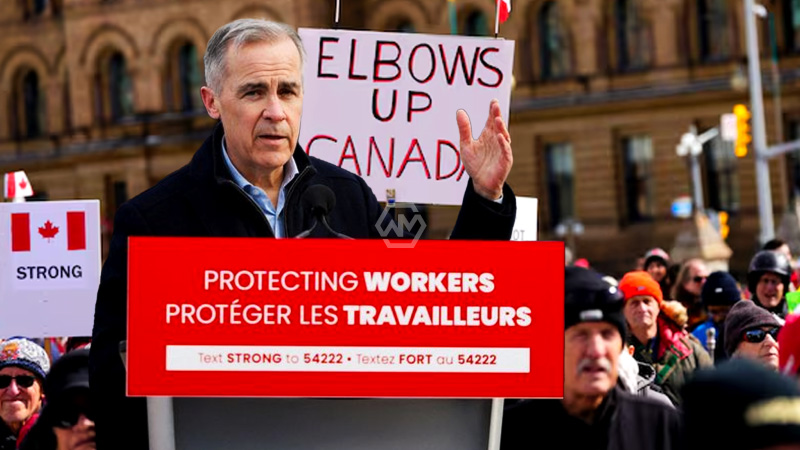- Mark Carney‘s Liberal Party gains momentum after Trump’s tariff threats.
- Conservative leader Pierre Poilievre emphasizes rising living costs.
- Polls show a tight race, with Carney’s experience in global finance seen as a key asset.
In the final days of Canada’s election campaign, Prime Minister Mark Carney has rallied voters with his stance against U.S. President Donald Trump’s protectionist policies.
On the other hand, Conservative leader Pierre Poilievre has stuck to his message on economic hardship. He blames the Liberals for Canada’s vulnerability to Trump’s trade actions.
Trump’s Tariff War Shakes Canada’s Election, With Carney Gaining Ground
Mark Carney’s sudden surge in the Canadian election race has been fueled by the heightened sense of urgency created by U.S. President Donald Trump’s aggressive trade policies. As Trump threatens to impose more tariffs and even absorb Canada into the U.S., Carney has positioned himself as the country’s defender. He took over as the Liberal leader in March. His message, emphasizing his international financial expertise, appeals to voters. Those who believe Canada needs a calm, experienced leader to navigate the turbulent economic waters ahead find his leadership appealing.
In contrast, Pierre Poilievre of the Conservative Party has focused on addressing Canadians’ frustration with rising living costs. This sentiment has resonated strongly in the final stretch of the campaign. Poilievre’s message is grounded in the idea that the Trudeau government’s economic policies have left Canada vulnerable. External pressures like Trump’s tariffs further support his argument that Carney’s leadership would continue that trend.
Polls show the race tightening, with the Liberals maintaining a slight edge over the Tories. However, much of the electorate’s decision may come down to regional concerns, particularly in Ontario and British Columbia. Both parties are vying for key battleground districts there. The rise of early voting, especially among those impacted by trade issues, suggests turnout could play a critical role in the outcome.
The New Democratic Party and Bloc Quebecois have seen declining support. This could benefit the Liberals in key provinces. Carney’s focus on international policy, particularly his condemnation of Trump’s trade actions, has helped position him as the candidate capable of defending Canadian interests on the world stage. Yet, the race remains volatile, with both parties pushing hard in the final days.
As Canada heads to the polls, the election’s outcome appears increasingly tied to voters’ perceptions of leadership. This is amid growing external pressures, especially Trump’s policies.
“Canadians are over the shock of that betrayal but we should never forget the lessons.” — Mark Carney, speaking on Trump’s tariffs and trade policies.



